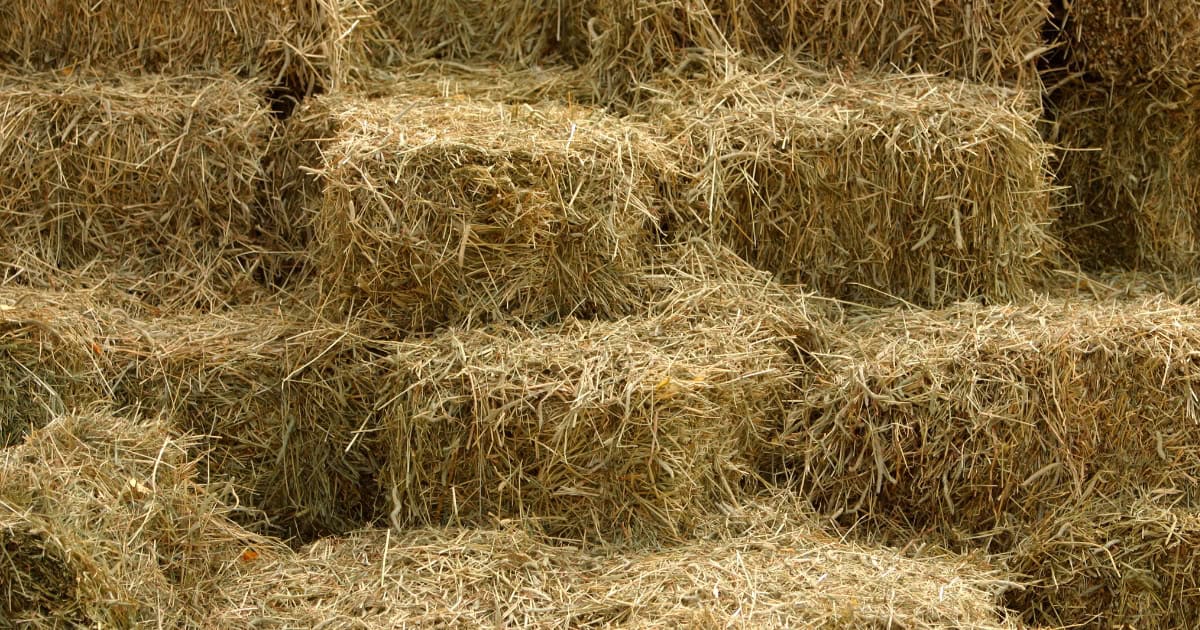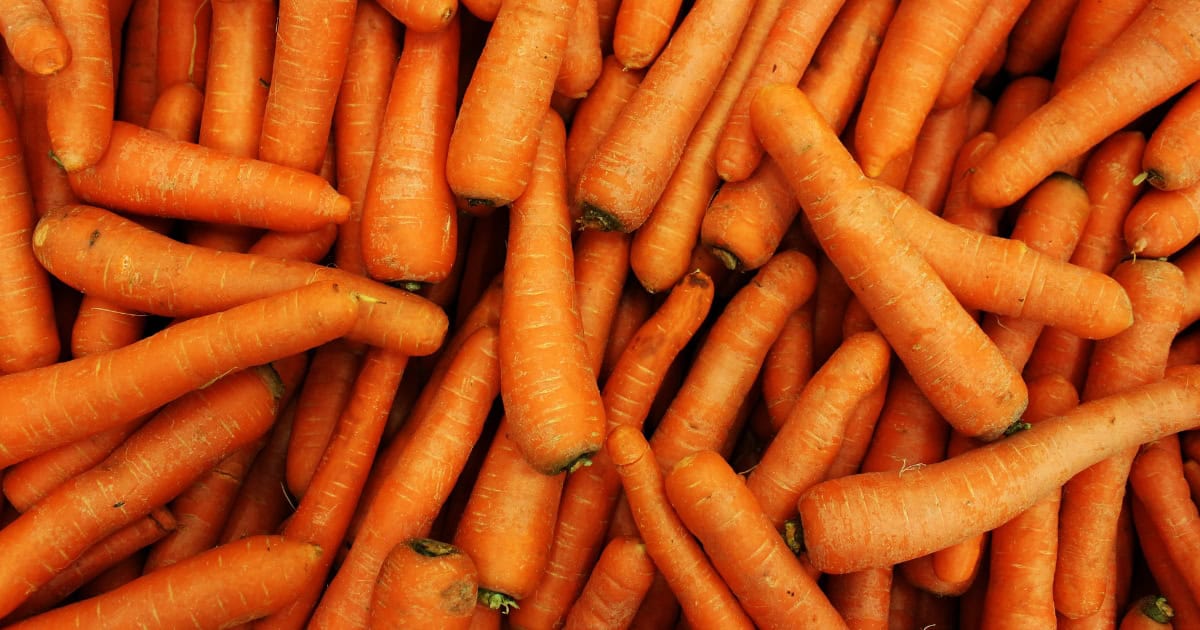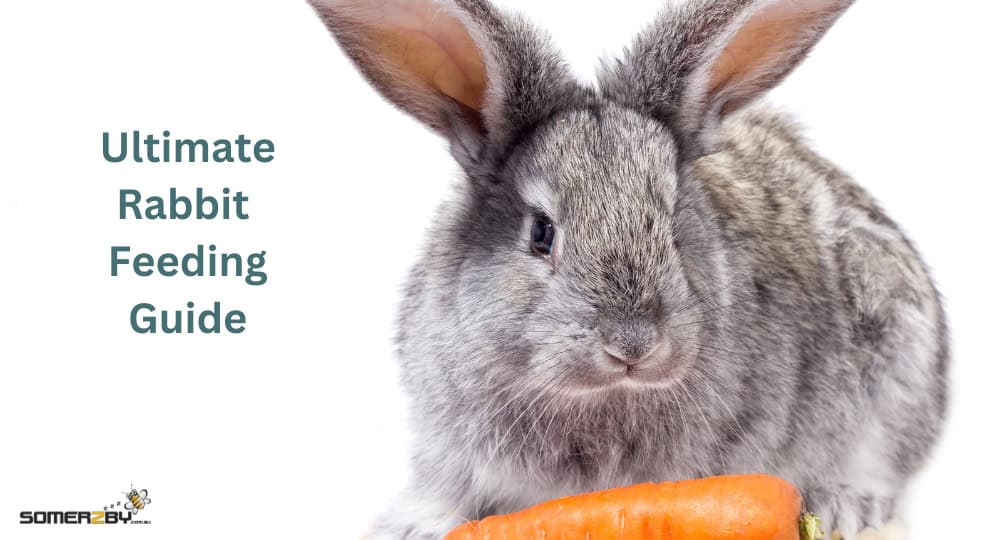Rabbits
Ultimate Rabbit Feeding Guide: Nutrition and Diet Tips
Welcome to our comprehensive Rabbit Feeding Guide, designed to help you understand the nutritional needs of your furry friend.
Providing the correct nutrition is essential for your rabbit’s health and wellbeing.
In this Rabbit Feeding Guide, we will delve into the various aspects of feeding your bunny, ensuring they receive all the essential nutrients required for a happy and healthy life.
Table of Contents
Hay
Grass hay plays a crucial role in maintaining your rabbit’s health, as it should make up 80-90% of their daily diet. It provides essential fibre that promotes proper digestion and dental health, ensuring your bunny stays happy and healthy.
Provide your pet rabbit with unlimited hay in their daily diet. Great feeding hay options include:
- Timothy Hay: This is a popular choice among rabbit owners due to its high fibre content and low calcium levels.
- Meadow Hay: Another excellent option with similar nutritional benefits to Timothy hay. It is less fragrant and usually cheaper to buy.
- Oat Hay: Oat hay is suitable for older rabbits who need lower protein levels but still require adequate fibre intake.
- Alfalfa Hay: Alfalfa hay is ideal for young rabbits under six months old because it has higher protein and calcium content necessary for growth; however, it should be fed sparingly to adult rabbits due to potential kidney issues from excessive calcium consumption.
Pellets
High-quality pellets play a crucial role in providing additional vitamins and minerals needed by rabbits. It’s essential to remember that pellets should only make up a small portion of the rabbit’s diet, around 5%.
Opting for plain, timothy pellets without added treats or seeds is the best choice for your furry friend. Rabbits can also be safely fed alfalfa pellets.
When choosing rabbit pellets, look for brands that prioritise natural ingredients and avoid those with artificial additives or preservatives.
Always remember these portion control tips:
- Measure Accurately: Use a measuring spoon or cup to ensure you’re giving your rabbit the correct amount of pellets each day based on their weight.
- Maintain Consistency: Feed your rabbit at consistent times every day to establish a routine and prevent overeating.
- Avoid Overfeeding: Resist the urge to refill your bunny’s pellet bowl if they finish it quickly; this can lead to obesity and other health issues.
- Mix It Up: Combine pellets with fresh vegetables and grass hay to encourage a balanced diet and prevent your rabbit from becoming too reliant on pellets.

Vegetables
Rabbits benefit from a diet enriched with fresh vegetables, as they offer essential nutrients including vitamins A and C, magnesium, and choline.
Incorporating a variety of safe veggies into your rabbit’s meal plan not only adds nutritional value but also keeps their meals interesting.
When introducing new vegetables to your bunny’s diet, it is important to do so gradually. Start by offering small amounts of one type at a time and observe how your pet reacts over the next 24 hours.
If there are no signs of digestive upset or discomfort, you can continue adding more varieties in moderation.
Safe vegetables that can be fed to your rabbit in moderation include:
- Cucumber: Including the leaves.
- Celery
- Spinach
- Lettuce: Best fed in small amounts. Avoid iceberg.
- Bok Choy
- Carrot: Including the carrot tops.
- Capsicum: Green, red or yellow. Remove seeds.
- Kale
- Watercress
- Herbs: Basil, mint, coriander, parsley, dill, oregano.
Fruits
While fruits can be enjoyed by rabbits occasionally, it is essential to remember that they contain high sugar content and must be fed sparingly.
Limit fruit treats to no more than one tablespoon per day to avoid obesity issues in your rabbit.
Safe fruits for rabbits include:
- Apple: Without seeds
- Watermelon
- Banana: In small amounts
- Peaches: No pit
- Raspberries: Including the leaves
- Strawberries: Including the leaves
- Pear

Foods to Avoid in Your Rabbit’s Diet
While it is important to provide your rabbit with a variety of healthy foods, there are certain items that can be harmful or even toxic.
As a responsible pet owner, you must be aware of these potentially dangerous foods and avoid feeding them to your bunny.
- Iceberg lettuce: Although rabbits can eat some types of lettuce, iceberg should be avoided due to its low nutritional value and high water content. Instead, opt for dark leafy greens like rocket.
- Excessive spinach: While small amounts of spinach can benefit your rabbit’s health, too much may lead to urinary tract issues and life-threatening bladder stones. Moderation is key.
- Grapes: Rabbits should not consume grapes as they are high in sugar which can contribute towards obesity.
- Potatoes
- Garlic
- Onions: Including leeks
The Dangers of Overfeeding Sugary Treats
Feeding excessive amounts of sugary treats like fruits can cause various health issues in rabbits, such as:
- Digestive Problems: Feeding too much sugar may disrupt the balance of bacteria in your rabbit’s gut, leading to digestive upset.
- Obesity: A diet high in sugar increases the risk of obesity which could result in other serious health complications like heart disease or arthritis.
- Tooth Decay: Sugar promotes tooth decay; hence overfeeding sweet rabbit treats may contribute to dental problems.
If you observe any abnormal behavior in your rabbit after they have eaten a new food item, seek veterinary advice immediately.
By being vigilant and informed about the foods to avoid in your rabbit’s diet, you can ensure their health and happiness for years to come.
FAQ
How Much and How Often Should I Feed My Rabbit?
Rabbits require constant access to fresh hay. Offer them around 1/4 cup of pellets daily for every 2kg of body weight.
Provide about two cups of leafy greens and vegetables each day for average-sized adult rabbits.
Fruits should be fed sparingly as occasional rabbit treats – no more than one or two tablespoons weekly.
Consider your bunny’s needs – growing rabbits and underweight rabbits eat more while senior rabbits or overweight rabbits should be fed less.
How Much Hay Should Be Provided Daily?
Rabbits need unlimited hay every day since they graze throughout the day. Ensure you’re providing enough by filling their feeding area at least once per day with fresh hay or whenever you notice it running low.
Additionally, always remove any soiled or damp portions promptly to prevent mold growth and maintain a clean environment for your pet.
Conclusion
Maintaining a nutritious diet for your growing rabbits is key to their health and prosperity.
This Rabbit Feeding Guide highlights the importance of hay as a primary food source, supplemented by pellets and fresh vegetables in moderation.
Fruits can be offered as occasional treats, but it’s essential to avoid providing excessive amounts of sugary foods and to introduce new foods gradually.
If you’re looking for high-quality outdoor enclosures for your rabbits or other pets, visit Somerzby.
Our range of pet enclosures is designed with safety, comfort, and affordability in mind so that you can provide your furry friends with a secure outdoor living space.




